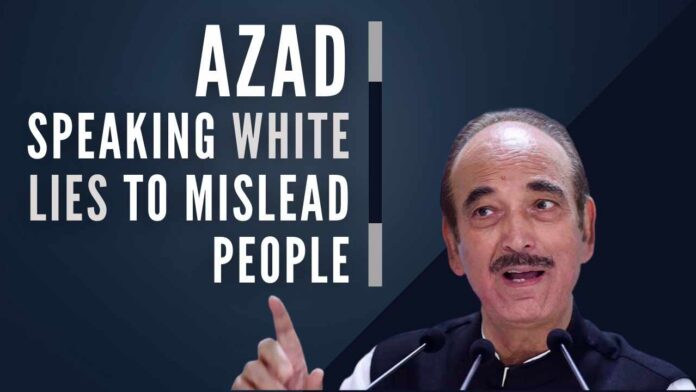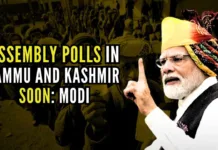
Will Azad and ilk in Kashmir appreciate the truth?
Ghulam Nabi Azad, who quit Congress last August, set up his own political outfit in Jammu on September 26. It was styled as Democratic Azad Party (DAP). Explaining his agenda and ideology, he said: “Restoration of full statehood with an Assembly with a Governor and not a Lieutenant Governor and with the power to enact laws, right to land and employment to native domiciles would form our three priority agenda. If the jobs are given to outsiders, J&K youth will lose even a trickle of employment avenues available here. Kudos to the late Maharaja Hari Singh, who provided us with these safeguards in 1925-30! Moreover, it is not unconstitutional as, after the accord, these provisions (read seditious Article 370 and discriminatory Article 35A) were ensured by the Indian Constitution and J&K Constitution and followed by all the presidents, and prime ministers of the country, irrespective of the party affiliations for over seven decades”.
Even a cursory look at what he said would establish that there was no fundamental difference between his agenda, ideology, and attitude to India and Indian laws and what other Kashmiri leaders, including Farooq Abdullah, Omar Abdullah, Mehbooba Mufti, Altaf Bukhari, Mohd Yousuf Tarigami and Sajad Lone, have been advocating since decades. Azad, like all these Kashmiri leaders – apart from pitching for a separate status for J&K on the score of religion – too strove to mislead the gullible people of J&K, especially Muslims, by reasserting that it was none other than the Maharaja of J&K, Hari Singh, who barred the non-Kashmiris from acquiring jobs under the state government and buying immovable property anywhere in the state through his State Subject Definition of 1927, which became a story of the past after the reading down of Article 370 and abrogation of Article 35A, which had declared all the non-Kashmiris a persona-non-grata in J&K w.e.f. May 14, 1944, when India was still under London and J&K as a princely state.
What Azad, who as J&K CM on March 29, 2006, advocated in Jammu University “Indo-Pak joint control of the state’s waters, power projects, agriculture, sericulture, tourism, forestry and environment”, and other Kashmiri leaders have been hailing Maharaja Hari Singh’s State Subject Definition is nothing but a dubious exercise calculated to create a wedge between J&K Muslims and all other Indians or holding J&K aloof from the national mainstream. Maharaja Hari Singh didn’t introduce the State Subject Laws to create a high wall of hatred between his state and the rest of the country but to defeat the conspiratorial activities being indulged in by the Kashmiri Muslim leadership and its supporters in British India, especially Punjab. The Kashmiri Muslim leadership had been working overtime for years to cultivate the British Indian government so that Kashmir become independent from the Dogra Kingdom and make all the government jobs and positions the sole preserve of the Kashmiri Muslims. Kashmir became part of the Jammu Kingdom in March 1846 under the Treaty of Amritsar, signed between Maharaja Gulab Singh of Jammu and the British Indian government.
Let me refer to just one example to make my point. In October 1924, the Kashmiri Muslim leadership submitted six representations to Lord Reading, Governor-General of India (J&K General Deptt. File No. 525/f/62 of 1924, State Archives Repository, Jammu). What did these representations demand?
These, among other things, demanded:
- “Further recruitment of Hindus in all grades of service be henceforth stopped and to enable the Muslims to receive their legitimate share in the administration of the state, all vacancies in all the departments caused by retirement, death or dismissal of the present incumbents henceforth be reserved for local Muslims. In case a local Muslim of requisite qualification and abilities was not available, a Muslim may be imported from outside the state who should be of independent character and temporarily appointed till a local Muslim of requisite qualifications is available”.
- “The Governor of a province being the guardian of agriculturists it was necessary that ‘there should be Muslim Governor’. In case the Muslims were not available for such high posts, Europeans be appointed as provincial governors. Similarly, other high positions such as superintendent of police, assistant superintendent of police, superintendent of customs, etc, be filled among Kashmiri Muslims. In case Muslims of requisite qualifications are not available for such high positions, ‘Muslims from outside or Europeans’ be appointed”.
“Since 1921 the Residency control (read British Resident’s control) over the state administration has been withdrawn, the Muslims’ position in Kashmir has become all the more insecure and unsafe and the state authorities have without any hesitation trampled down the rights of Muslims. To revive the old political set up the Kashmir residency be reinvested with the same power of control over the state that it exercised 20 years earlier and that the Residency is made responsible to safeguard the Muslim rights in every matter”. Maharaja Pratap Singh, who was deposed by imperialist London in 1889 on the false charge that he, along with Maharaja of Patiala, was conspiring against British rule, was given back his authority in 1921.
The demands put forth by the Kashmiri Muslim leadership in October 1924 and after should clear all the cobwebs of confusion. The State Subject Definition of Maharaja Hari Singh has to be viewed in this context. Will Azad and ilk in Kashmir appreciate the truth? The answer cannot be in the affirmative for reasons not really difficult to fathom as they are trained in different kinds of seminaries.
Note:
1. Text in Blue points to additional data on the topic.
2. The views expressed here are those of the author and do not necessarily represent or reflect the views of PGurus.
PGurus is now on Telegram. Click here to join our channel and stay updated with all the latest news and views
For all the latest updates, download PGurus App.
- ‘Kashmir My core constituency’: Revisiting July 12, 2003 to understand politics, Omar Abdullah-style - March 15, 2024
- Total deviation from traditional approach: Seven takeaways from PM Modi’s March 7 Srinagar visit - March 9, 2024
- Status of political parties: Why is further J&K reorganization imperative? - March 1, 2024










